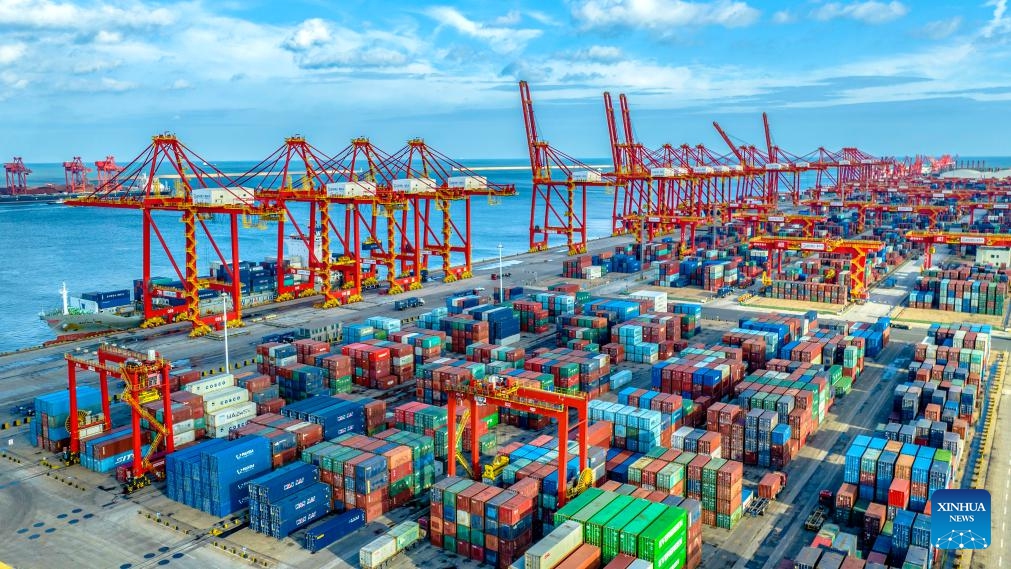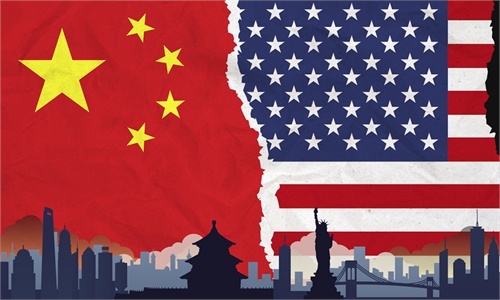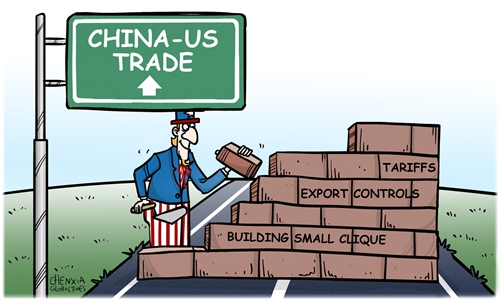Nearly half of US companies call for lowering tariffs on Chinese goods: AmCham Shanghai survey

An aerial drone photo taken on July 2, 2024 shows a view of Rizhao Port in Rizhao, east China's Shandong Province. In recent years, Shandong Province has leveraged its marine resources to promote the integrated reform and development of coastal ports, to create a world-class port group. (Photo: Xinhua)
Nearly half of surveyed US firms have called for Washington to lower tariffs on Chinese goods, according to a latest business environment report on Thursday.
Chinese experts noted that the US government’s actions have persistently undermined fair and free trade, forcing American companies to adopt less-than-optimal growth strategies in an atmosphere of cascading uncertainty, while businesses are inclined to operate in stability.
“When asked how the US government could support foreign firms in China, 48 percent [of US firms] suggested it reduce tariffs on Chinese goods,” read the 2024 China Business Report released by American Chamber of Commerce in Shanghai (AmCham Shanghai) on Thursday.
“Our member companies have acknowledged [Chinese] government efforts to improve the regulatory environment,” Eric Zheng, president of AmCham Shanghai, said in the report, noting that geopolitical uncertainties are weighing more than ever.
“We respectfully encourage both governments to continue to engage in bilateral talks so as to stabilize the relationship,” Zheng said.
Tariffs have indeed become a major disruptive factor in China-US economic and trade cooperation, Zhou Mi, a senior research fellow at the Chinese Academy of International Trade and Economic Cooperation, told the Global Times on Thursday.
The US government has continued to undermine fair and free trade, including the repeated imposition of additional high tariffs on Chinese goods, which has had a significant impact on American businesses, Zhou said.
The lack of stability in trade is affecting corporate decision-making. In this climate of uncertainty, businesses are more inclined to seek stability in China, Zhou noted.
Exactly half of respondents saw higher business revenues in 2023 than in 2022, with the rate highest for the retail sector and lowest for the manufacturing sector, the survey with 306 respondents showed.
Revenue expectations for this year are cheerier, with 54 percent of members expecting revenues to rise compared with last year, though only 37 percent expect China revenue growth to outpace global growth in the next three to five years, the report said.
A higher rate of the members this year noted improvements in government policies and regulations toward foreign companies and more transparency in the regulatory environment. Meanwhile, nearly one-third said that China’s enforcement of IP rights has improved, read the report.
Data from Chinese Ministry of Commerce showed that China saw the establishment of nearly 32,000 new foreign-invested enterprises from January to July, an increase of 11.4 percent year-on-year. This indicates that foreign investors remain largely optimistic about the long-term prospects of investing in China, the ministry said.
US electric car producer Tesla broke ground on another mega factory in Shanghai in May, marking the company’s first energy storage factory outside the US to manufacture its energy storage batteries known as Megapacks.
At the ongoing 2024 China International Fair for Trade in Services (CIFTIS) held in Beijing, a total of 85 countries and international organizations set up exhibits and hosting events. Over 450 Fortune 500 companies and industry leaders participate in-person, with more than 100 activities scheduled and over 200 integrated innovation results to be announced. Tesla has participated in the CIFTIS for eight consecutive years.
China’s policies on openness and efforts to enhance regulatory transparency are boosting foreign companies’ confidence in their future development in the country. The continuous recovery of China's economy is providing businesses with higher profits, which is also a key reason why many are expanding their investments in China, Zhou said.
Global Times


